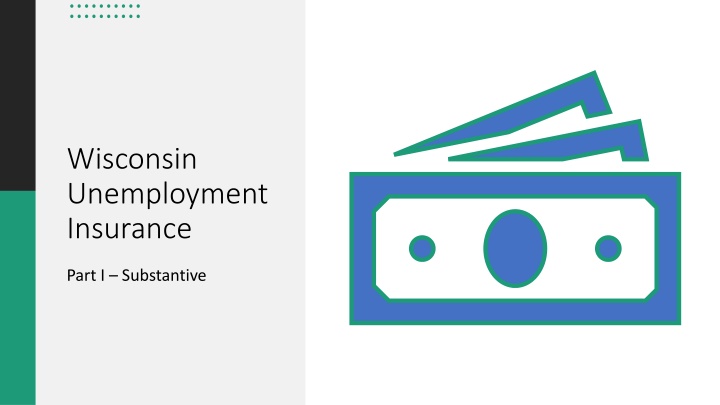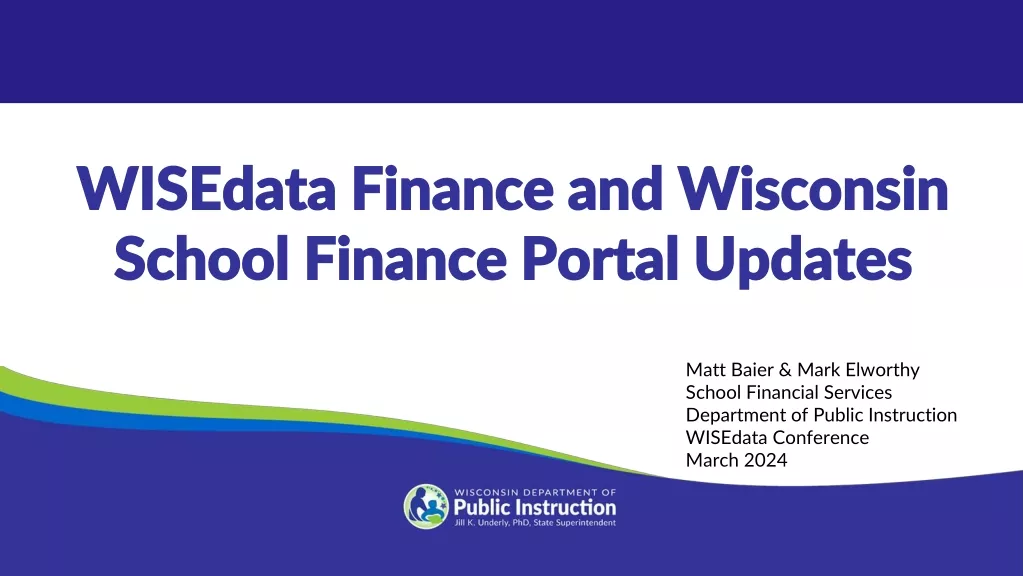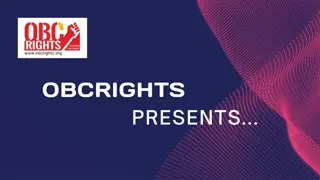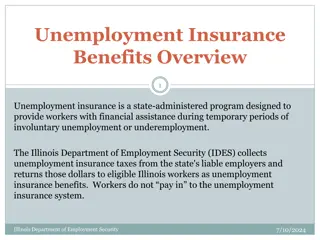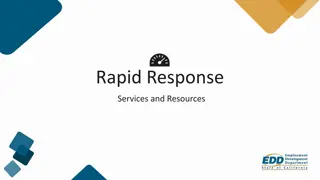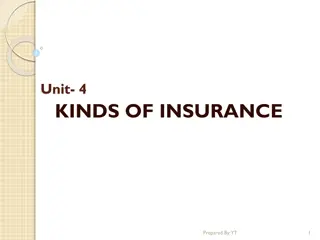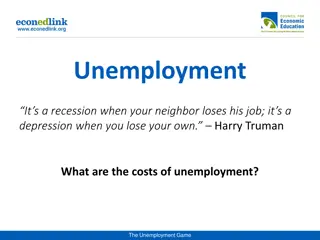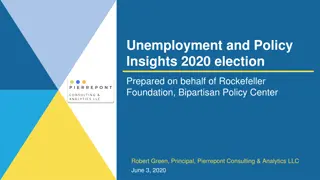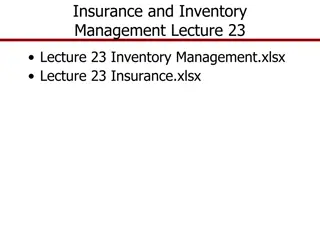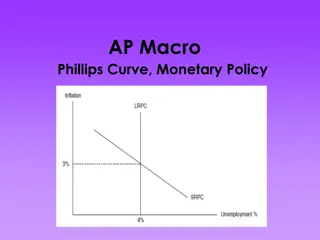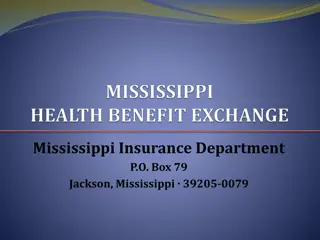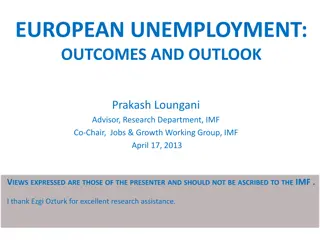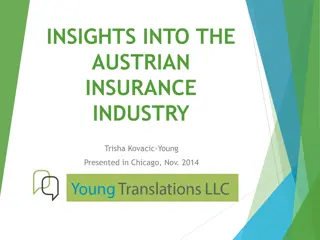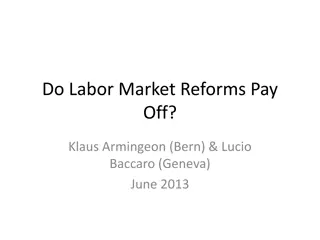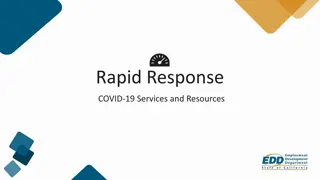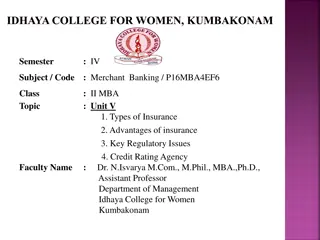Wisconsin Unemployment Insurance Overview
Wisconsin Unemployment Insurance (UI) program was established in 1932 as part of the Social Security Act. Paid for by state and federal payroll taxes, UI provides economic support to unemployed workers. Administered by the Department of Workforce Development, the program offers benefits based on a percentage of the claimant's regular income, with a maximum weekly amount. To qualify, individuals must have recent employment with a covered employer and meet certain earnings criteria. Various rules and regulations govern UI in Wisconsin, including disqualification factors, work search requirements, and eligibility for part-time workers.
Download Presentation

Please find below an Image/Link to download the presentation.
The content on the website is provided AS IS for your information and personal use only. It may not be sold, licensed, or shared on other websites without obtaining consent from the author.If you encounter any issues during the download, it is possible that the publisher has removed the file from their server.
You are allowed to download the files provided on this website for personal or commercial use, subject to the condition that they are used lawfully. All files are the property of their respective owners.
The content on the website is provided AS IS for your information and personal use only. It may not be sold, licensed, or shared on other websites without obtaining consent from the author.
E N D
Presentation Transcript
Wisconsin Unemployment Insurance Part I Substantive
Agenda Introduction Requirements/Disqualifications Sufficient earnings at covered employment Work registration Work search activity Able and available Separation from employment Other disqualifications Overpayments and Concealments COVID-19 Changes and Programs Wisconsin rule changes CARES Act programs Applications and appeals to be covered in next session
Introduction What is UI? Wisconsin created the first unemployment benefit program in 1932 the Social Security Act of 1935 included provisions to encourage all states to enact unemployment programs (26 U.S.C. 3301 et seq.) This is done through tax policy The Federal Unemployment Tax Act (FUTA) is part of the IRS Code The purpose was to: Provide economic stimulus during the Great Depression To give unemployed workers some means of support
Introduction Paid for by state and federal payroll taxes on employers Like insurance, the more claims higher tax employer pays Gives employer incentive to fight claims Administered by the Department of Workforce Development (DWD) Weekly benefit amount is 40% of the claimant s regular income with a maximum of $370/week Can still apply if working part-time but certain income excluded when calculating benefits ( 108.05(3)) First $30 of wages disregarded Benefits reduced by 67% of the remaining wages Wages can include vacation pay, back pay, sick pay, termination pay or a bonus
Introduction What/where are the rules? Wis. Stat. Chapter 108 Wis. Admin Code Chs. DWD 100-150 Handbook for Claimants: https://dwd.wisconsin.gov/uiben/handbook/ Labor and Industry Review Commission decisions (you can see how LIRC decided past cases) https://lirc.wisconsin.gov/unemployment_insurance.htm
Requirements/Disqualifications Recent/sufficient employment through a covered employer Earned enough through employment by a covered employer in recent quarters to qualify Employment is work done for pay (Wis. Stats. 108.02(15)) Most private employers covered Must pay at least $1,500 during a calendar quarter in the current or the previous calendar year, or employed at least 1 worker for at least part of a day in 20 different weeks during the current or previous calendar year ( 108.02(13)(e)) Government work covered ( 108.02(13)(a)) Except for elected officials ( 108.02(15)(f)(1)) Higher standards for some employers
Requirements/Disqualifications Employees vs. Independent Contractors An employee is somebody working for an employing unit ( 108.02(12)(a)) And an employing unit is something that employs somebody ( 108.02(14m)) See, tautology noun, the saying of the same thing twice in different words, generally considered to be a fault of style (e.g., they arrived one after the other in succession). Independent contractor is not defined (or used) in Ch. 108, but the standard for determining that status is stated under the definition of employee by excluding a person if his/her ( 108.02(12)(bm)) Services are performed free from control or direction by the employing unit over the performance of [the worker s] services Statute provides a non-exclusive list of factors to consider, including training, instruction, control of how work is performed and who does the work This is an appealable disqualification issue Independent contractor may qualify for Pandemic Unemployment Assistance
Requirements/Disqualifications Work Registration Requirements NOT waived due to COVID-19 (confusing everyone. Lots of denials) Wis. Stat. Section 108.04(2)(a) 2 General Qualifying Requirements Claimant is only eligible during a week that the claimant has registered for work in the manner prescribed by the department by rule. DWD 126.02 Registration File an application to establish a benefit year Complete and submit all info for registration within the time specified by department (register and upload resume on jobcenterofwisconsin.com within 14 days of initial app) Good cause for not using computer-based program
Requirements/Disqualifications Work Registration Requirements (Cont.) DWD 126.03 Waiver of work registration requirement (2) employer-verified reasonable expectation of re-employment within 8 (or 12) weeks (7) circumstances which the department determines are beyond the claimant s control. Confusion over COVID requirements, didn t receive proper notice etc. Work search and work registration are NOT the same requirement These denials are being overturned on appeal due to the confusion
Requirements/Disqualifications Work Registration Requirements (Cont.) Re-employment sessions Must do a re-employment session to remain eligible Used to be in-person, as of May 20, 2020, the session is available online After registering on JobCenterofWisconsin.com (JCW) and creating a resume, individuals may be asked to view an online orientation and take an assessment. At the end of the assessment, participants will be informed if they must participate in the Re- Employment Services program. Participants will be asked to sign up for a three-hour window for the "tele-session." The participant will be called at some point during the three-hour window they have selected. A presentation will be emailed to the participant prior to the phone call for reference. The participant must be available and answer the phone when called by the Re-Employment Services facilitator. The facilitator will call twice. Failure to answer the phone after the two attempts could result in a loss of UI benefits. The incoming call may be from an "unknown" or "blocked" caller.
Requirements/Disqualifications Work Search activity Waived via Executive order due to COVID-19 Four work search activities required each week Contacts must be made with employers who may be reasonably expected to have openings for suitable work Contact can be filling out an application, job interview, etc. Cannot contact the same employer within 4 weeks of last contact unless a new job has been posted Other work search activities: posting a resume on a job board, taking an online course through the job center If work search does not meet requirements, claimant is not eligible that week
Requirements/Disqualifications The work search requirement can be waived if: The claimant is working 20 hours per week or more There is a reasonable expectation to return to work within 8 weeks Can be extended to 12 weeks Will start a new job within 4 weeks Claimant uses a union for work referrals COVID-19 (or any other executive or department order)
Requirements/Disqualifications Able and Available Able and Available ( 108.04(2)(a)(1), DWD Ch. 128) able means having the physical and mental ability to perform suitable work It does not require the ability to perform all types of past work Must be able to perform a reasonable percentage of suitable work available means not having withdrawn from the labor market Able and available disputes are often raised by DWD rather than the employer If a claimant is not able and available for work, not eligible for that week Currently modified but not fully waived due to COVID-19
Requirements/Disqualifications Separation from employment UI is for people who lose their job through no fault of their own Layoff Straightforward. No disqualification. Most common now due to COVID-19. Discharge Misconduct or Substantial fault Quit Good cause attributable to the employer Quit vs. Discharge Appealable issue Can be surprisingly ambiguous E.g. boss says get out! employee says fine, I m done!
Requirements/Disqualifications Discharge Misconduct ( 108.04(5)) Boynton Cab (1941 court case) standard willful and wanton disregard of an employer s interests or carelessness or negligence of such degree or recurrence as to manifest equal culpability. Inefficiency, unsatisfactory work and ordinary negligence do not meet this standard Recently codified into law Misconduct must be connected to employment Off-duty conduct may be considered if it has an effect on work duties Off-work drinking and drug use may be considered relevant to work, depending on the nature of the work
Requirements/Disqualifications Misconduct (Cont.) Factors in evaluating misconduct Frequency of conduct Absenteeism and tardiness (new statute) Excessive tardiness in violation of a policy communicated to workers If an employee gives notice and a valid reason for absence or tardiness, it is excused Neglect of duties Nature of the conduct Theft or fighting nearly always deemed misconduct, other than self-defense in a fight Harassment and discrimination Insubordination Violation of work rules Are the rules generally enforced? Falsifying business records Workplace environment Type of language tolerated Workplace norms/common occurrences (e.g. was it common practice to arrive 20 minutes late, which policies don t allow?)
Requirements/Disqualifications Misconduct (Cont.) Penalty for misconduct Ineligible to receive benefits for 7 weeks following discharge Must earn 14 times the weekly benefit rate to requalify Wages from employer that discharged for misconduct are excluded from base period wages (except for purpose of determining the WBR for requalification)
Requirements/Disqualifications Discharge Substantial Fault ( 108.04(5g)) (newer law) Acts or omissions over which the claimant had reasonable control that violate reasonable requirements of the employer Does not include: Minor infractions of rules unless repeated after warnings Inadvertent errors Operton v. LIRC, 2017 WI 46, Supreme Court held that 8 errors by a cashier over a 2 year period when she handled 80,000 transactions amounted to inadvertent error Easterling v. LIRC, 2017 WI App. 18 court of appeals held that mistakes cannot constitute substantial fault Failure to perform work due to insufficient skill or equipment Important to evaluate all substantial fault cases for these exceptions
Requirements/Disqualifications Substantial Fault (Cont.) Penalty for substantial fault Ineligible for 7 weeks following the discharge Must earn 14 times the weekly benefit rate to requalify Wage credits are not canceled This means earnings from this employer ARE used in calculation of benefit rate The FUTA permits cancellation of wage credits only for misconduct or fraud This is why there s some benefit to getting a case dropped from misconduct to substantial fault
Requirements/Disqualifications Misconduct Case/Substantial fault example: Worker with an intellectual disability who worked for grocery store for 20 years. Frequently felt bullied. Got upset and called his boss dumbass in the back room. ALJ thought this was horrible and found misconduct. Overturned at LIRC. Also not substantial fault. What if he said this in front of customers? What if no disability and had been warned previously?
Requirements/Disqualifications Voluntary Quit (108.04(7)) Workers who quit a job without good cause attributable to the employer are generally not eligible for benefits The employer has the burden of proving a worker quit The claimant has the burden of proving good cause attributable to the employer Common reasons that may be good cause Substantial cuts in pay Shift change that interferes with child care
Requirements/Disqualifications Voluntary Quit (Cont.) More common good cause reasons: Reduction in hours Employer requesting worker to engage in illegal conduct Abuse by employer Sexual harassment by employer or by co-worker if employer has notice and does not take steps to prevent Unsafe work conditions Not taking reasonable precautions against COVID-19 Not good cause attributable to the employer if: Work is too hard Inadequate training or supervision Harsh treatment short of abuse Claimant believes that he/she is not performing job adequately
Requirements/Disqualifications Voluntary Quit (Cont.) More good cause reasons Quit to take a new job New job must have better pay, more hours, a longer term of employment or be significantly closer to the worker s home Recent change in the law. Used to disqualify people unfairly (e.g. quit to take better job but then lose better job through no fault) Quit to prevent contact from abuser Requires physical abuse or the threat of physical abuse to claimant or household member Protective order, police report or verification of abuse by health care provider or DV shelter Health of self or immediate family member that employer cannot accommodate able to work issues still may affect claim
Requirements/Disqualifications Voluntary Quit (Cont.) If worker tells employer that they will quit on a specific date in the future, and employer terminates prior to that date, eligible between termination and the specified quit date Temp Agencies To avoid a quit finding when a work assignment ends, a worker should: Contact the temp agency within 2 days of the end of an assignment if that is the agency policy Not required if the agency knows that job has ended Accept a new assignment of suitable work If no new assignment within 7 days of the end of the prior work, not a quit Treated as a termination If last employed by a temp agency, must contact it weekly (unless agency has a different policy) to seek a new assignment Case example temp agency offered a computer job to someone who couldn t do computers knowing they d turn it down Penalties for voluntary quit Ineligible for benefits until claimant has earned 6 times the WBR Wage credits not cancelled
Requirements/Disqualifications Voluntary Quit with good cause attributable to the employer case example Employee worked at a small company owned by a brother and sister. Only 3 employees in the office, brother, sister, and employee. Brother and sister constantly fighting, using foul language, throwing things. Good cause to quit? What if one day the brother yelled at the employee and poked employee in the chest?
Requirements/Disqualifications Quit or Discharge? The standard for a voluntary quit is that the claimant has indicated by statement or action an intention to leave Who initiated the discussion of termination? An option to quit or be fired is not a quit Some employers think they re sneaky by allowing an employee to resign instead of quit If a worker is unsure whether the employer is terminating employment, he/she is expected to clarify this with the employer If they assume a termination based on criticism and leave it may be treated as a quit A refusal to accept a reasonable transfer may be considered a quit Unapproved or excessive absences can be considered a quit as well as misconduct
Requirements/Disqualifications Discharge Quit or Discharge? Misconduct Yes Quit No Good Cause attributable to employer? No Yes Substantial Fault No Yes Benefits Denied Benefits Allowed!
Requirements/Disqualifications Other disqualifications Refusal of Suitable Work ( 108.04(8)) Benefits denied for failure, without good cause, to accept suitable work Suitable work considerations 6 week canvassing period allowed Can limit work search for jobs at same skill level and at least 75% of past pay Work is considered suitable if at the same pay but for fewer hours Can apply for partial UI benefits After 6 weeks, must accept any work available that pays wages above the lowest quartile for similar work in the labor market Canvassing period does not apply if receiving extended benefits, unless claimant shows that prospects for finding employment in customary work within 4 weeks are good
Requirements/Disqualifications Refusal of Suitable Work (Cont.) Can refuse work that is available due to a strike, lockout or other labor dispute Can refuse work if wages, hours or other conditions are substantially less favorable than for similar work in the locality The department will run a labor market analysis Statute provides that a refusal to take a drug test or a failed drug test is treated as a refusal of suitable work
Requirements/Disqualifications Other disqualifications Disciplinary Suspension Ineligible for first 3 weeks of the suspension Suspension must be for good cause related to employment Miscellaneous School employees are not eligible between terms if they have a reasonable assurance that they will return to work for the next term ( 108.04(17)) Undocumented immigrant ( 108.04(18)) Ineligible unless they are permanently residing under color of law (PRUCOL) Occupational license ( 108.04(1)(f)) If an employee loses a government-issued license required to perform a job and job is suspended or terminated for this reason, he/she is ineligible to receive benefits for 5 weeks or until the license is reinstated Wages from employer who suspended or terminated are excluded from base period wages until license is reinstated
Requirements/Disqualifications Other disqualifications SSDI (Wis. Stat. 108.04(12)(e)) Social Security Retirement and SSI receipt does NOT disqualify Only WI and NC has this law Because it s an eligibility issue, the argument is that the person should qualify for Pandemic Unemployment Assistance (PUA) Dept. initially said no, but possible change in position forthcoming
Overpayment and Concealment Overpayments ( 108.22(8)) If benefits are paid incorrectly due to the fault of the employer because of its failure to report, and the claimant is not at fault, there is no overpayment If the overpayment is due to DWD s fault, and the claimant is not at fault, the overpayment may be waived upon request If an initial determination resulted in payment of benefits and is later reversed If no concealment, overpayment exists and benefits must be repaid If there is concealment by the claimant, the overpayment must be repaid and additional penalties will be added 40% of the overpayment amount fine Withholding from future benefits of 2x to 8x the weekly benefit amount, depending on the number of acts of concealment
Overpayment and Concealment Concealment ( 108.04(11)) Requires an intent to mislead the department by withholding information or making a false statement A claimant has a duty of care when making a weekly claim to be accurate and complete In determining concealment, DWD takes into account A failure to read or follow instructions Reliance on statements of non-DWD staff Whether the claimant is impaired and informed DWD of it Claimant s past UI claims experience Past determinations involving concealment Other factors related to intent DWD is very aggressive in alleging concealment Will claim concealment in nearly all overpayments due to claimant error without requiring clear evidence of intent Claimant s duty to read and fully understand entire handbook APPEAL! Often overturned on appeal unless intent is clear
COVID-19 Changes/Programs Wisconsin changes Waiting week eliminated Work search waived But may still need to register with the Job Center, post a resume, complete an assessment and attend a re- employment session over the phone
COVID-19 Changes/Programs Wisconsin changes (Cont.) Able & Available requirements modified Sick or self-quarantined not able/available Mandatory quarantine may be eligible
COVID-19 Changes/Programs CARES Act Programs Pandemic Unemployment Assistance (PUA) 2102 Federal Pandemic Unemployment Compensation (FPUC) 2104 Pandemic Emergency Unemployment Compensation (PEUC) 2107 https://dwd.wisconsin.gov/uiben/caresact/
COVID-19 Changes/Programs CARES Act Programs - Pandemic Unemployment Assistance (PUA) PUA is a temporary federal program that provides up to 39 weeks of unemployment benefits to individuals who are not eligible for regular Unemployment Insurance (UI) such as: Individuals who are self-employed. Certain independent contractors. Individuals with limited recent work history. Other workers not covered by Regular UI. SSDI Recipients? Must also be: Partially or fully unemployed due to COVID-19-related reasons Not able to telework Not receiving paid leave Otherwise able and available to work (except for COVID-19 related reasons)
COVID-19 Changes/Programs CARES Act Programs - Pandemic Unemployment Assistance (PUA) (Cont.) PUA runs from January 27, 2020, to December 31, 2020. PUA Benefits can be retroactive Separate application in the individual s UI dashboard Those who qualify for PUA will also qualify for the extra $600/week of Federal Pandemic Unemployment Compensation (FPUC)
COVID-19 Changes/Programs CARES Act Programs - Federal Pandemic Unemployment Compensation (FPUC) FPUC pays an additional $ 600 per week to individuals who are eligible for and receiving any type of UI benefit, through July 2020. 2104. In Wisconsin, FPUC payments began the week of April 26, 2020, and will end after July 31, 2020. Income counted for FoodShare but not Medicaid Income IS taxable
COVID-19 Changes/Programs CARES Act Programs - Pandemic Emergency Unemployment Compensation (PEUC) PEUC provides 13 additional weeks of UC benefits for individuals who have exhausted regular UC benefits. 2107 State UC or PUA benefits must be exhausted Claimant must be seeking work Common Example someone was already on UI before the pandemic hit and now their benefits are exhausted
COVID-19 Changes/Programs Returning to work - Health and Safety Concerns: Workers who are concerned that their private-sector employer is not keeping their workplace safe from COVID-19 can file a complaint with the U.S. Occupational Safety and Health Administration (OSHA). Wisconsin is one of more than two dozen states whose workplace safety complaint and enforcement systems are primarily under the federal government's jurisdiction, with public-sector workers covered separately. Additional details and resources are available online. Employers do have an obligation under the Fair Employment Act to reasonably accommodate workers with disabilities -- including disabilities that might put them at higher risk from COVID-19 infection. Workers with safety concerns due to disability should work with their employer to request and identify appropriate accommodation. Failure to provide this accommodation might be good cause to quit or refuse to go back to work
Resources Free representation for appeals: Legal Action of Wisconsin Judicare (northern 33 counties) UI Appeals Clinic (call Dane Co. United Way) https://dwd.wisconsin.gov/ui/ Blog by local UI attorney, has some good posts on Pandemic UI programs: https://wisconsinui.wordpress.com/
The End (El Fin) Questions? ( Preguntas?)
